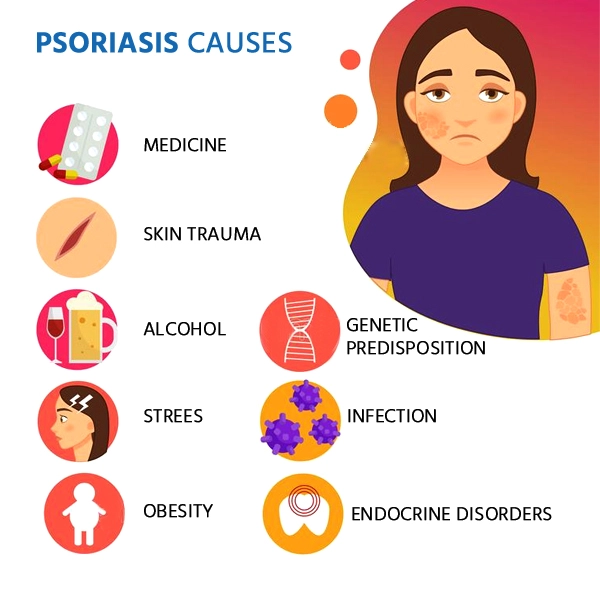Introduction
In this blog post, we will explore the powerful practice of mindfulness meditation and its potential to enhance the treatment of psoriasis. Mindfulness meditation involves bringing one’s attention to the present moment and cultivating non-judgmental awareness of thoughts, emotions, and bodily sensations. It has gained significant attention in recent years for its numerous health benefits and is increasingly recognized as a valuable tool for managing various physical and mental health conditions.
Understanding Psoriasis
A Chronic Skin Condition Psoriasis is a chronic autoimmune disorder characterized by the rapid buildup of skin cells, leading to red, scaly patches on the skin’s surface. It affects millions of people worldwide and can cause significant physical discomfort, as well as emotional and psychological distress. While conventional treatments such as topical creams, phototherapy, and systemic medications exist, many individuals seek additional approaches to complement their existing treatment plans.
Exploring the Potential of Mindfulness Meditation for Psoriasis
In recent years, mindfulness meditation has emerged as a promising adjunctive therapy for various health conditions, including psoriasis. Research studies have highlighted its potential to alleviate stress, anxiety, and depression—factors that can trigger or worsen psoriasis flare-ups. By incorporating mindfulness meditation into their treatment regimen, individuals with psoriasis can potentially experience a reduction in symptoms and an improved quality of life.
Throughout this blog post, we will delve deeper into the relationship between mindfulness meditation and psoriasis treatment. We will explore the scientific evidence supporting its effectiveness, discuss specific mindfulness techniques beneficial for managing psoriasis symptoms, and provide practical tips for integrating mindfulness into daily routines. Join us on this journey of discovery as we unlock the potential of mindfulness meditation in enhancing psoriasis treatment.
Understanding Psoriasis
Definition and Types of Psoriasis
Psoriasis is a chronic inflammatory skin condition that affects the life cycle of skin cells. It is characterized by the rapid production of skin cells, causing them to build up and form thick, silvery scales and red, itchy patches. There are several types of psoriasis, including plaque psoriasis, guttate psoriasis, inverse psoriasis, pustular psoriasis, and erythrodermic psoriasis. Each type has its unique characteristics and may require specific treatment approaches.
Causes and Triggers of Psoriasis Flare-ups
The exact cause of psoriasis is still not fully understood. However, it is believed to result from a combination of genetic, immune system, and environmental factors. Common triggers for psoriasis flare-ups include stress, infections (such as strep throat), injuries to the skin, certain medications, smoking, excessive alcohol consumption, and changes in weather or climate. Identifying and managing these triggers can play a vital role in managing psoriasis symptoms.
Conventional Treatment Options and Their Limitations
Conventional treatments for psoriasis aim to alleviate symptoms, reduce inflammation, and slow down the excessive growth of skin cells. These include topical treatments (such as corticosteroids, retinoids, and moisturizers), phototherapy (exposure to ultraviolet light), and systemic medications. In spite of their ability to provide relief to many individuals, these treatments may have potential side effects.
A solid understanding of psoriasis, its types, causes, triggers, and conventional treatment options sets the groundwork for exploring how mindfulness meditation can enhance existing treatments.
Exploring Mindfulness Meditation
Explanation of Mindfulness Meditation and Its Principles
Mindfulness meditation involves intentionally paying attention to the present moment without judgment. It promotes a non-reactive, compassionate stance towards oneself by cultivating awareness and acceptance of one’s thoughts, emotions, and bodily sensations. Maintaining an attitude of openness and curiosity while focusing on breathing, bodily sensations, or external stimuli.

Benefits of Mindfulness Meditation for Overall Well-being
Mindfulness meditation has been extensively studied and has shown numerous benefits for mental, emotional, and physical well-being. Regular practice has been associated with reduced stress, anxiety, and depression, improved emotional resilience, enhanced focus and concentration, and increased self-awareness. It can also promote better sleep, lower blood pressure, and boost overall immune function.
Scientific Evidence Supporting the Effectiveness of Mindfulness Meditation
Research has demonstrated the effectiveness of mindfulness meditation in various clinical populations and health conditions. Studies have shown that mindfulness-based interventions can significantly reduce stress-related symptoms, including inflammation and cortisol levels, which can be particularly relevant for individuals with psoriasis. Additionally, mindfulness meditation has been associated with improved psychological well-being, coping abilities, and quality of life.
By incorporating mindfulness meditation into their daily lives, individuals with psoriasis may benefit from its potential to reduce stress, enhance emotional well-being, and positively influence the course of their condition.
The Connection Between Mindfulness Meditation and Psoriasis
Research Studies Linking Mindfulness Meditation to Psoriasis Treatment
Several research studies have examined the potential benefits of mindfulness meditation for individuals with psoriasis. These studies have shown promising results, indicating that mindfulness-based interventions can lead to a reduction in psoriasis symptoms and an improvement in overall well-being. The practice of mindfulness meditation has been associated with decreased itchiness, scaling, and redness of psoriatic lesions, as well as a reduction in the frequency and severity of psoriasis flare-ups.
Alleviating Stress and Anxiety, Common Triggers for Psoriasis Flare-ups
Stress and anxiety are known triggers for psoriasis flare-ups. Mindfulness meditation offers a valuable tool for managing these psychological factors. By cultivating a present-moment awareness and developing a non-reactive attitude towards stressors, individuals with psoriasis can potentially reduce the impact of stress and anxiety on their condition. This practice can help regulate the body’s stress response, lower cortisol levels, and promote relaxation, thereby potentially mitigating the triggering effects of stress on psoriasis symptoms.
Mindfulness Techniques Specifically Tailored for Managing Psoriasis Symptoms
Individuals can adapt and tailor mindfulness meditation to address the specific challenges they face with psoriasis. They can use techniques like body scans to systematically bring their attention to different parts of the body, helping them develop a greater awareness of their physical sensations, including itchiness and discomfort associated with psoriasis. They can also utilize visualization and guided imagery practices to promote healing and foster a positive mindset toward managing psoriasis.
By incorporating mindfulness meditation into their psoriasis treatment plan, individuals can potentially experience a reduction in symptoms, improved emotional well-being, and an increased sense of self-care and empowerment.
Enhancing Psoriasis Treatment with Mindfulness Meditation
Incorporating Mindfulness Meditation into Existing Treatment Plans
Mindfulness meditation can be a valuable addition to existing psoriasis treatment plans. It is important to note that mindfulness meditation is not intended to replace medical interventions but rather to complement them. Individuals with psoriasis can work with their healthcare providers to integrate mindfulness practices into their overall treatment approach. By combining conventional treatments with mindfulness meditation, individuals may experience enhanced symptom management and improved overall well-being.
Practical Tips for Integrating Mindfulness into Daily Routines
- Start with short sessions: Begin with shorter mindfulness meditation sessions, gradually increasing the duration over time. Even a few minutes of practice each day can yield benefits.
- Find a quiet and comfortable space: Create a peaceful environment where you can practice without distractions. Find a comfortable posture, either sitting or lying down, and ensure proper support for your body.
- Focus on the breath: Use the breath as an anchor for your attention. Pay attention to the sensations of inhaling and exhaling, and whenever your mind wanders, gently bring it back to the breath.
- Cultivate non-judgmental awareness: Practice observing your thoughts, emotions, and bodily sensations without judgment or attachment. Allow them to arise and pass without getting caught up in them.
- Incorporate mindfulness into daily activities: Extend mindfulness beyond formal meditation sessions by bringing awareness to everyday activities such as eating, walking, or showering. Engage all your senses and be fully present in the moment.
- Utilize guided meditations and apps: Explore guided mindfulness meditations or mindfulness apps that offer structured sessions and provide guidance for beginners.
- Seek support and join a community: Consider joining a mindfulness meditation group or seeking support from like-minded individuals who can provide encouragement and share experiences.
By integrating mindfulness into daily life, individuals with psoriasis can harness its potential to manage stress, enhance self-care, and cultivate a positive mindset, ultimately supporting their overall treatment journey.
Mindfulness Meditation Techniques for Psoriasis
Breathing Exercises and Body Scans for Relaxation and Stress Reduction
Deep breathing exercises can help individuals with psoriasis manage stress and promote relaxation. You can reduce anxiety by practicing diaphragmatic breathing, box breathing, or the 4-7-8 breath. By focusing on different parts of your body, you can develop a greater awareness of your physical sensations. This will enable you to identify and address areas of tension or discomfort associated with psoriasis.
Visualization and Guided Imagery Techniques to Promote Healing
Visualization and guided imagery practices can support individuals with psoriasis in fostering a positive mindset and promoting healing. The process of visualization involves creating mental images of desired outcomes, such as envisioning healthy, clear skin. Guided imagery involves following a recorded script or guided meditation that directs the mind to imagine soothing scenes or healing processes, helping individuals cultivate a sense of calm and well-being.
Mindfulness-Based Stress Reduction Programs and Their Relevance to Psoriasis Management
Mindfulness-Based Stress Reduction (MBSR) is an evidence-based program developed by Jon Kabat-Zinn that combines mindfulness meditation, yoga, and mindful movement. MBSR programs have shown promising results in reducing stress-related symptoms and improving overall well-being. Considering the strong link between stress and psoriasis flare-ups, individuals with psoriasis may find participating in an MBSR program beneficial in managing stress and enhancing their psoriasis treatment journey.
By exploring and practicing these mindfulness meditation techniques, individuals with psoriasis can empower themselves with practical tools to manage stress, reduce anxiety, and foster a positive mindset. It is important to remember that consistency and regular practice are key to experiencing the full benefits of mindfulness meditation.

Additional Supportive Practices
Healthy Lifestyle Habits to Complement Mindfulness Meditation
- Balanced diet: Consuming a nutritious diet rich in fruits, vegetables, whole grains, and lean proteins can support overall health and potentially contribute to the management of psoriasis symptoms. Some individuals with psoriasis may find that certain foods, such as processed foods or foods high in sugar, trigger flare-ups. Paying attention to personal dietary triggers can be helpful.
- Regular exercise: Engaging in regular physical activity can have numerous benefits for individuals with psoriasis. Exercise promotes circulation, reduces stress, and supports overall well-being. Choose activities that you enjoy and are suitable for your fitness levels, such as walking, yoga, swimming, or cycling.
- Adequate sleep: Prioritizing quality sleep is crucial for managing stress and supporting the body’s healing processes. Establish a relaxing bedtime routine, create a comfortable sleep environment, and aim for the recommended 7-9 hours of sleep each night.
Complementary Therapies and Practices Worth Considering
- Aromatherapy: Essential oils such as lavender, chamomile, and tea tree oil may have soothing and anti-inflammatory properties that can provide relief for psoriasis symptoms. Consult with a qualified aromatherapist or healthcare professional for appropriate usage and dilution guidelines.
- Acupuncture: Traditional Chinese medicine practices like acupuncture have been explored as complementary approaches for managing psoriasis symptoms. Acupuncture involves the insertion of thin needles into specific points on the body to stimulate energy flow and promote balance. Seek guidance from a licensed acupuncturist.
- Stress management techniques: In addition to mindfulness meditation, incorporating other stress management techniques into daily life can be beneficial. These may include practicing yoga, engaging in relaxation exercises, journaling, or seeking support from therapists or support groups.
By integrating these supportive practices alongside mindfulness meditation, individuals with psoriasis can create a holistic approach to managing their symptoms and improving their overall well-being.
Overcoming Challenges and Establishing a Routine
Addressing Common Obstacles When Starting a Mindfulness Meditation Practice
Starting a mindfulness meditation practice can sometimes present challenges. It is important to acknowledge and address these obstacles to establish a consistent routine:
- Time constraints: Finding time for mindfulness meditation amidst a busy schedule can be a common challenge. Consider starting with shorter sessions and gradually increasing the duration as you build a habit.
- Restless mind: It is normal for the mind to wander during meditation. Instead of becoming frustrated, gently guide your attention back to the present moment without judgment.
- Lack of motivation or discipline: Maintaining consistency in meditation requires discipline and motivation. Remind yourself of the benefits and set realistic goals. Engaging in group meditation sessions or using meditation apps can provide additional support and accountability.
Strategies for Maintaining Motivation and Consistency
To establish a regular mindfulness meditation practice:
- Set a consistent schedule: Designate a specific time and place for your daily practice. Making it a non-negotiable part of your routine will help establish the habit.
- Start with small steps: Begin with shorter meditation sessions and also gradually increase the duration as you become more comfortable.
- Find accountability partners: Joining a meditation group or finding a meditation buddy can provide support, encouragement, and motivation.
- Celebrate progress: Acknowledge and celebrate the milestones in your meditation journey, no matter how small. This positive reinforcement can further reinforce your commitment and motivation.
Seeking Support from Mindfulness Meditation Communities and Professionals
Engaging with mindfulness meditation communities and seeking guidance from professionals can offer valuable support:
- Mindfulness meditation groups: Join local meditation groups or online communities where you can connect with like-minded individuals, share experiences, and learn from one another.
- Mindfulness teachers or mentors: Consider working with a mindfulness meditation teacher or mentor who can provide guidance, and personalized instruction, and help navigate any challenges that may arise.
By overcoming challenges and establishing a regular mindfulness meditation routine, individuals with psoriasis can harness the full potential of this practice to support their overall well-being and psoriasis treatment journey.
Conclusion
Recap of the Benefits of Mindfulness Meditation for Psoriasis Treatment
Throughout this blog post, we have explored the powerful potential of mindfulness meditation in enhancing the treatment of psoriasis. By incorporating mindfulness meditation into existing treatment plans, individuals with psoriasis can experience a range of benefits, including stress reduction, improved emotional well-being, and also potentially a reduction in psoriasis symptoms. Mindfulness meditation offers a holistic approach that complements conventional treatments and further empowers individuals to take an active role in their own healing journey.
Encouragement for Readers to Explore Mindfulness Meditation as an Adjunct to Their Current Treatment
If you are living with psoriasis, we encourage you to explore mindfulness meditation as a valuable adjunct to your current treatment plan. Engaging in regular mindfulness practices can support stress management, promote relaxation, and foster a positive mindset, all of which may contribute to a reduction in psoriasis symptoms and an improved overall quality of life. Remember to consult with your healthcare provider and work collaboratively to integrate mindfulness meditation into your treatment approach.
Final Thoughts on the Potential of Mindfulness Meditation in Fostering Overall Well-being and Managing Psoriasis
In addition to treating psoriasis, mindfulness meditation can enhance overall well-being and provide valuable tools for stress management and self-care. Practicing mindfulness meditation helps individuals cope with psoriasis by cultivating present-moment awareness and also developing compassion for themselves.
As you embark on your mindfulness meditation journey, remember that consistency, patience, and self-compassion are key. Start small, be gentle with yourself, and also celebrate each step forward. By embracing mindfulness meditation as a complementary practice, you have the opportunity to discover new ways of managing your psoriasis and nurturing your overall well-being.
Wishing you a transformative journey of mindfulness and healing!












